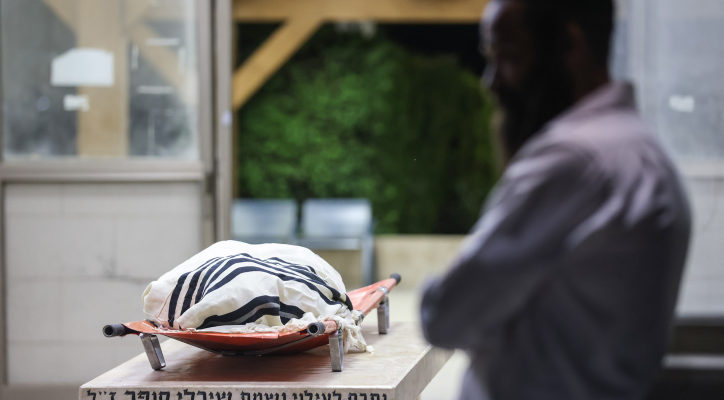‘Until this very moment we do not have positive identification of Liel’s body but we know she was murdered,’ a relative said.
By Edgar Lefkovits, JNS
Clothes. Perfume. Sewing materials from school.
In the end, these were the belongings of a 12-year-old Israeli girl, burned alive in the Oct. 7 Hamas massacre, which were buried late Wednesday in the small cemetery of this kibbutz in the Negev Desert, alongside the graves of her twin brother and their grandfather’s sister, who had raised them as her own children.
Despite the lack of official identification for Liel, the family chose to hold a farewell ceremony for her. They also decided to bring personal belongings for burial.
Even in a country of ever-mounting mourning for young lives lost, of hopes and plans blotted out—beginning with the attack on communities bordering the Gaza Strip, the tragic story of the Hetzroni twins is a bitter ending to two children’s lives that began in sorrow and ended in unimaginable grief.
The 12-year-old twins, Liel and Yanai Hetzroni, were raised from birth by their grandfather’s sister Ayala Hetzroni at Kibbutz Be’eri. Their mother, Shira, suffered brain damage following their C-section birth, due to a tragic hospital mistake.
Over a decade later, on Saturday morning, Oct. 7, tragedy would strike the family again.
First, the twins’ grandfather Avia Hetzroni, who lived nearby on the kibbutz, was murdered by the Hamas terrorists who overran the community as he hid in his safe room. He was shot by the infiltrators and bled to death. Medics were unable to reach him in time as scores of terrorists rampaged through the border kibbutz, which lost about 10% of its population.
Hearing the shouting and the shooting, Liel texted a teacher that she was suffocating. “Hang in there,” the teacher replied by WhatsApp.
“Gaza has entered the gates of Be’eri,” Ayala texted a friend at 12:57.
In the early afternoon, the twins and their great-aunt were snatched from their home by a group of terrorists and held captive in another house along with 12 other hostages, most of them elderly kibbutz members.
“I was with the children in the home with the terrorists in the last hours of their life,” Yasmin Porat, 44, who was one of only two of the group of hostages to survive, told JNS. “I can see them now—Liel was very stressed and was crying, while her brother Yanai was calmer.”
Porat, who is from northern Israel, had stopped at the kibbutz with her boyfriend after attending a desert dance festival to take cover from rocket attacks, when they too were seized.
She said she made seven calls to the police during the afternoon, at the behest of the terrorists. In one of the calls, the terrorists put the frantic Liel on the phone, because they thought Porat was being too controlled in her conversation and they wanted a sobbing child to get on the call.
At about 5:30 p.m., one of the terrorists led Porat out of the house at gunpoint. He surrendered to Israeli security personnel, taking off his clothes to show he did not have a bomb, Porat reported.
The dozens of other terrorists remained barricaded inside the house with the 14 other hostages, including the petrified children, she said.
Later in the afternoon, a firefight erupted and all the remaining hostages were killed, except for one woman, Porat said. Hadas Dagan was somehow blown outside during the fight.
The house went up in flames and burned down to cinders.
It took two weeks to identify Yanai Hetzroni through DNA. Ayala was only identified after a month, while Liel was never officially identified, Ayala’s nephew Omri Shifroni, 38, said. Yanai was laid to rest alongside his grandfather.
“Until this very moment we do not have positive identification of Liel’s body but we know she was murdered,” Shifroni said at the start of the joint funeral service for Liel and Ayala at Revivim, their temporary resting place until their own community of Be’eri, now a closed military zone, can be re-inhabited.
Hundreds of people, mourning the twins and the woman who cared for them, lined the well-kept cemetery, in the crisp late afternoon desert air. Shifroni’s older brother Sagi, wounded and bandaged from the fighting in Gaza, walked alongside the fresh graves.
As the siblings were laid to rest, a golden sunset streaked over the graves.
“Soon it will rain, and the anemones will bloom in red,” a family member said.





